In the wake of several surprising 2021 election losses in Europe, has the Covid-19 pandemic damaged leaders’ electoral prospects? Brett Meyer presents evidence that populist leaders in Europe are more likely to be punished at the polls than non-populist leaders, as are leaders in countries with lower pre-pandemic levels of trust.
The last twelve months were a surprisingly tumultuous electoral year in Europe, with heads of government losing power in Bulgaria, the Czech Republic, Germany and Norway, and the leaders of both Austria and Italy resigning. Some of these developments would have appeared extremely surprising at the beginning of the year, including the SPD’s victory over the once dominant CDU in Germany and populist Andrej Babis’ loss in the Czech Republic.
Country-specific analyses of these losses have focused on a variety of factors, including corruption and party leader gaffes. There has been less focus on the role the Covid-19 pandemic might have played, despite waves of infections spreading across much of Europe in 2021, driven first by the Delta variant and then by the new Omicron variant towards the end of the year.
Eastern Europe, which was largely spared during the first wave of Covid-19 in spring 2020, was hit hard by the autumn and had some of the highest death rates in the world by early 2021. There have been several waves of political discontent over a variety of accompanying issues, including slow rollout of vaccines and what many perceive to be excessive lockdowns.
While it is difficult to assess whether Covid-19 caused the election losses we saw in 2021, it is possible to investigate how support for governments changed throughout the pandemic. To do this, I assembled polling data for all parties in government in 23 EU countries plus the UK from January 2018 through November 2021 and merged this with data on case and death rates from Johns Hopkins University.
In Figure 1 below, I plot average support for all parties in government against average monthly Covid-19 deaths. Support for governments goes up during the first wave of deaths, consistent with a rally-around-the-flag effect that I found for eight western European countries in research in autumn 2020. But after this, government support shows the opposite relationship with Covid-19 deaths, decreasing slightly as the second wave peaks but then increasing again as it recedes.
Figure 1: Government polling support and Covid-19 deaths
Note: Countries include Austria, Bulgaria, Croatia, the Czech Republic, Denmark, Estonia, Finland, France, Germany, Greece, Hungary, Ireland, Italy, Latvia, Lithuania, the Netherlands, Poland, Portugal, Romania, Slovakia, Slovenia, Spain, Sweden, and the UK.
Why do we see a difference in government polling responses to Covid-19 death rates in the first and second waves? One possibility is that the countries affected by the first and second waves differed, with the first wave largely affecting western Europe and the second affecting both eastern and western Europe. In Figure 2 below, I separate government support in eastern and western Europe then plot this support against average monthly Covid-19 deaths.
Figure 2: Government polling support and Covid-19 deaths in eastern and western Europe
Note: Eastern Europe includes Bulgaria, Croatia, the Czech Republic, Estonia, Hungary, Latvia, Lithuania, Poland, Romania, Slovakia, and Slovenia.
The first thing we notice is that while governments in eastern Europe had been more popular than those in western Europe before the pandemic began, this trend quickly reversed. Government support increased in both western and eastern Europe through April, then plateaued in the west but started to decline in the east. When I plot support in each region against average deaths in the region, I find that government support in eastern Europe had settled back to around or even slightly below its pre-pandemic average, then declined further when the death rate spiked.
Why do we see this difference between eastern and western Europe? One possibility is different levels of trust in government between the two regions. If trust in government is high, especially in an environment like a pandemic where there is uncertainty about what governments can achieve, citizens might be willing to give their governments the benefit of the doubt.
The 2018 Wellcome Trust Global Monitor, which asked respondents about their level of trust in their government, found that 51% of respondents in western Europe had ‘some’ or ‘a lot’ of trust in government while only 40% of those in eastern Europe did. Commentators have noted that the lack of trust in government in eastern Europe is a legacy of communism. Consistent with a general lack of trust in authorities, vaccination rates in eastern Europe are also lower.
In Figure 3, I plot the correlation between the pre-pandemic Wellcome Trust data and change in support for the government from Feb-May 2020. There is a strong, positive correlation (r~.55). But this correlation declines with time to less than r=.2 by autumn 2021. In Figure 3C, which plots change in government support between February 2020 and June 2021, the correlation is down to r~.22 because of a loss of government support in several higher trust countries.
Figure 3: Trust and change in support for government
Note: Compiled by the author.
Finally, three of the five leaders who lost power in 2021, those in Bulgaria, the Czech Republic, and Italy, were populists. We might expect populist leaders to poll poorly in a pandemic as citizens are reminded of the importance of seriousness and expertise in government. Indeed, the number of populist leaders in power around the world at the beginning of 2022 has fallen to 13, the lowest since 2004. Although I found last year that all populist leaders in these countries took Covid-19 seriously during the first few months of the pandemic, their reputations for populist decision-making may have hurt them as the outcomes of the pandemic became worse.
Populist leaders had been polling ahead of non-populists before Covid-19 but then fell behind, continuing their decline as death rates increased. While this trend reversed at the end of 2021, by this time, two of the six populist leaders in office at the beginning of the pandemic had lost power (in Bulgaria and Italy). A third, Andrej Babis of the Czech Republic, would leave office in December. As Figure 4 shows, there is a clear correlation between rising Covid-19 deaths and a decline in support for populist governments. This effect does not exist to the same extent for non-populist governments.
Figure 4: Covid-19 deaths and polling support for populist and non-populist governments
Note: Since March 2020, there have been populist leaders in Bulgaria (though May 2021), the Czech Republic (through December 2021), Hungary (entire period), Italy (through February 2021), Poland (entire period), and Slovenia (entire period).
These results suggest that citizens’ pre-Covid-19 perceptions of their countries’ leaders affected their assessments of their leaders’ actions during the pandemic. Trust in government was higher before the pandemic in western Europe, which may have triggered and helped maintain the initial increases in support for governments while support receded for governments in eastern Europe – even before Covid-19 deaths began to increase. A reputation for divisiveness and eschewing expertise may have made citizens more critical of populist leaders, even though their pandemic responses were similar to those of non-populist leaders.
Note: This article gives the views of the author, not the position of EUROPP – European Politics and Policy or the London School of Economics. Featured image credit: European Council


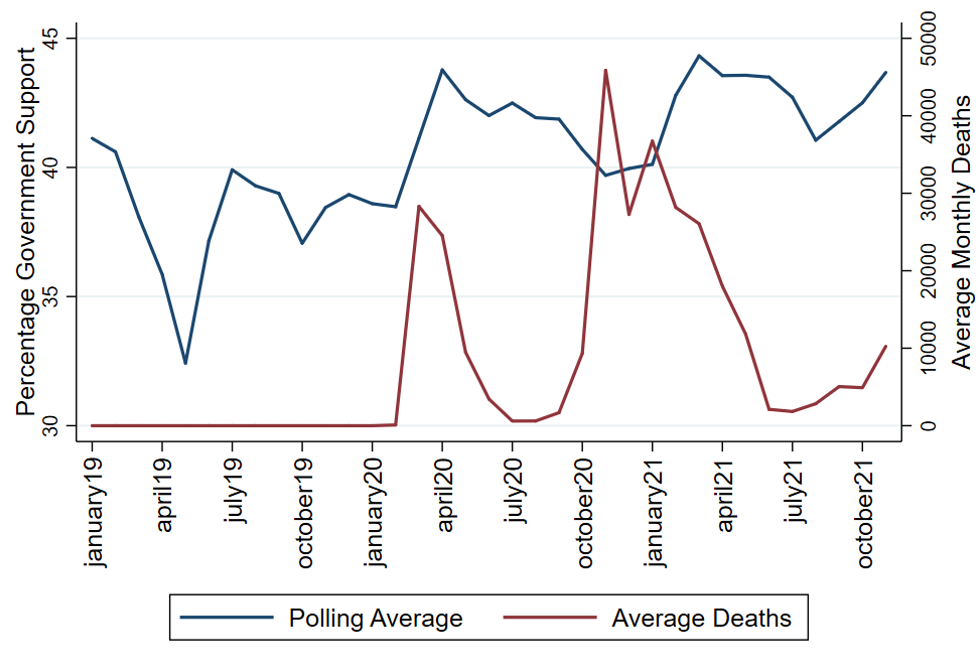
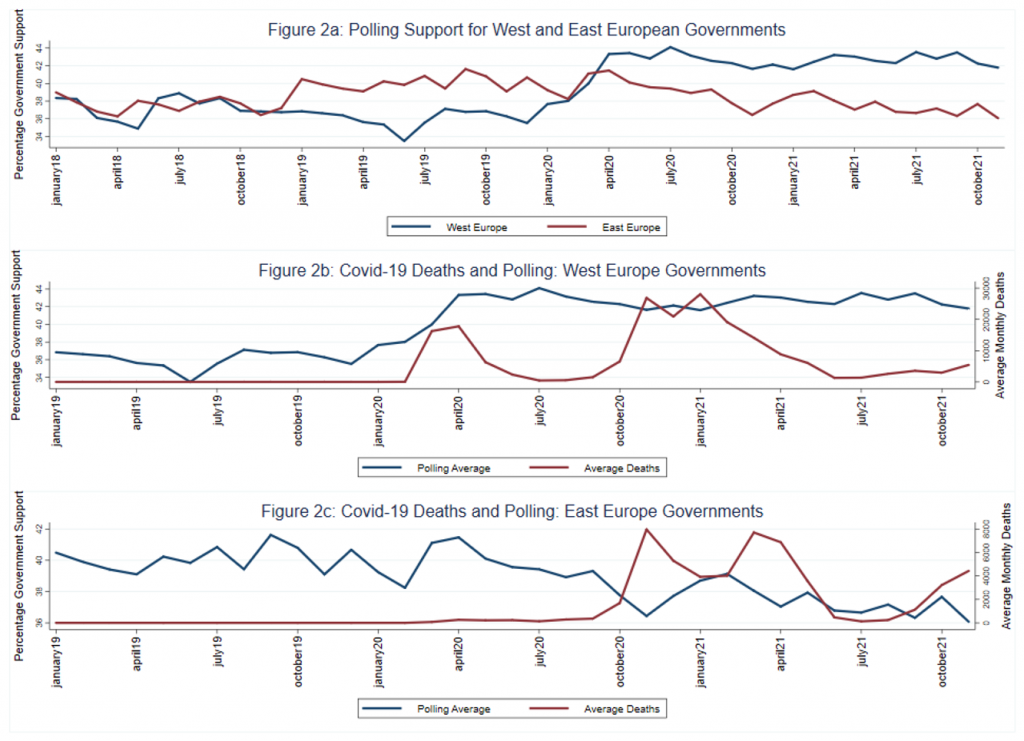
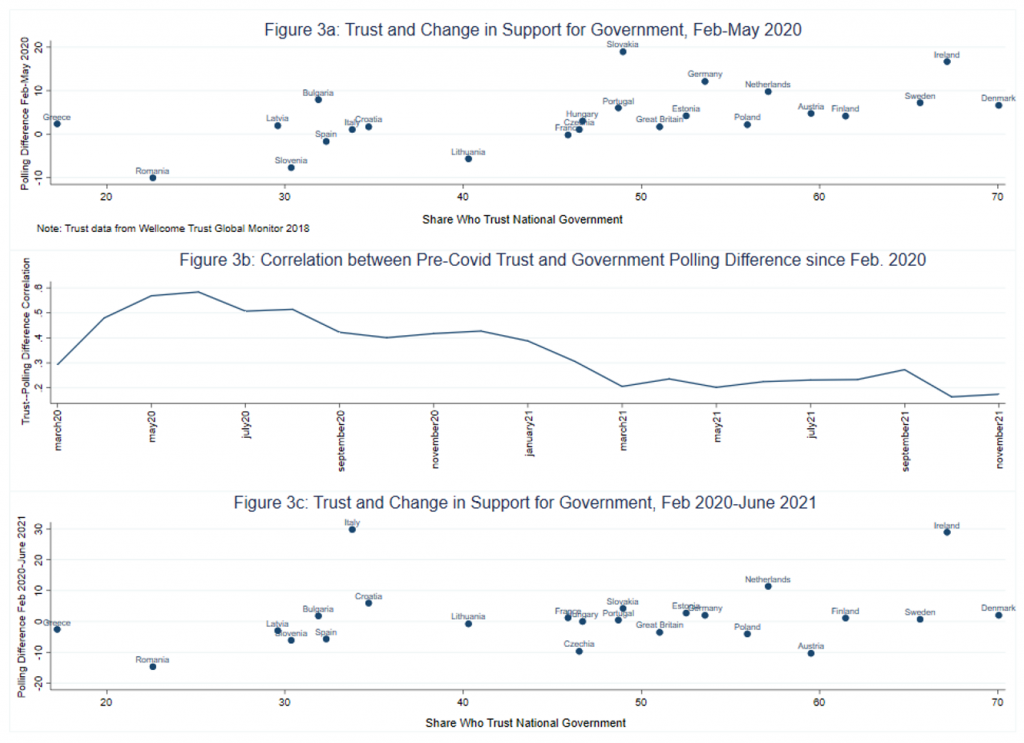
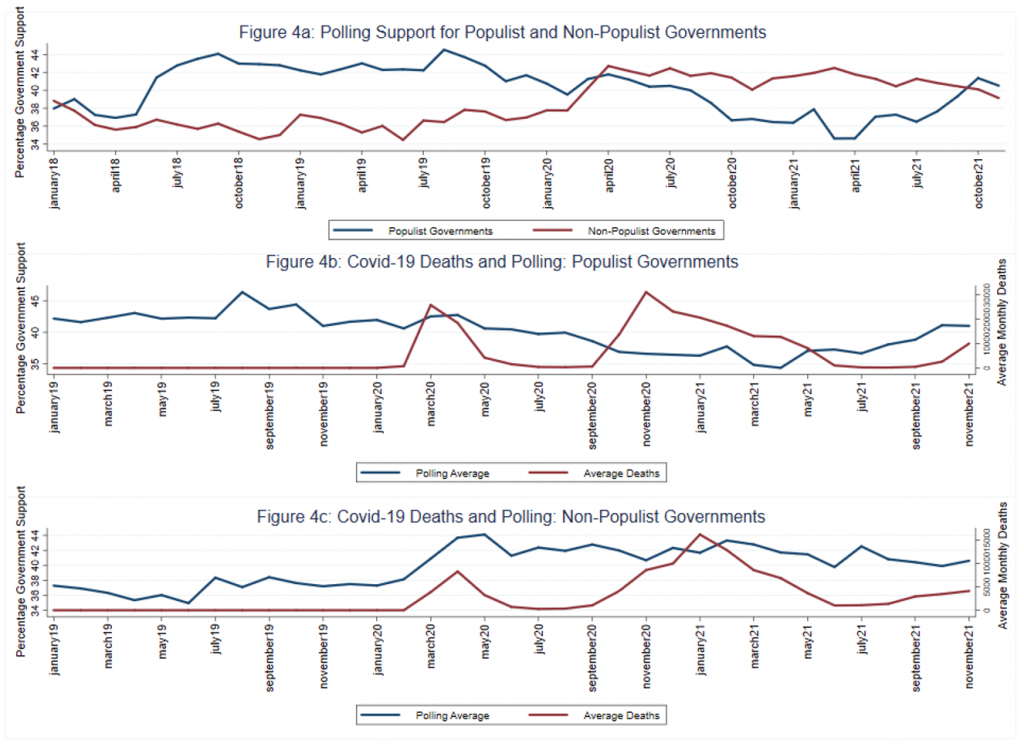

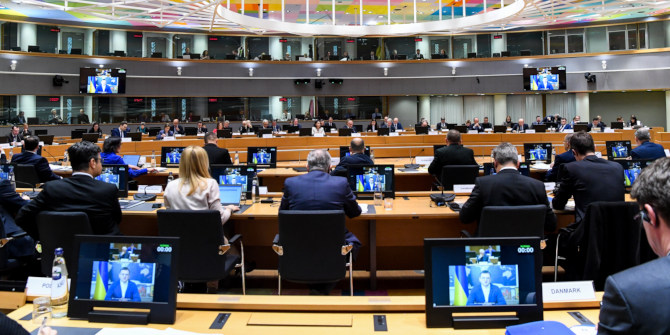
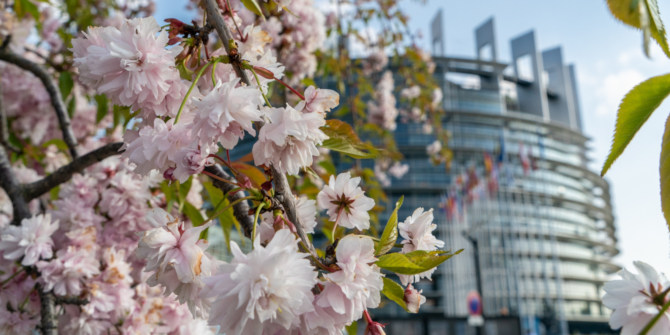

Interesting…..
…with one glaring omission.
What is the definition of “populist” being used ?
At the very end, the nearest we get is:
“A reputation for divisiveness and eschewing expertise.”
That sounds remarkably close to:
“Political Opponents take a different view”
and
“Political Opponents use “experts” with a different view.”
Throughout Covid, some Governments have sought “experts” who will deliver the conclusions that those Governments want
e.g.. the “expert” interviewed by Fraser Nelson, who claimed:
“We provided “worst case scenarios” because that is what the Govt. asked us to do.”
Other “experts” have drawn different conclusions from the data on Covid.
Does that make them “populist stooges” ?
I would recommend you read “the populist zeitgest” by Cas Mudde. It’s freely available online and basically gives the definition of populism that is most commonly used in academia. The article also explains in detail why populism isn’t a “pathology” it’s just a different style of politics – though of course that doesn’t mean populist parties like being termed “populist”.
Thanks for the pointer.
Cas Muddle defines populism as:
” an ideology that considers society to be ultimately separated into two homogeneous and antagonistic groups, ‘the pure people’ versus ‘the corrupt elite’, and which argues that politics should be an expression of the volonté générale (general will) of the people.”
Doesn’t that seem a tad simplistic for an academic ?
That said, perhaps he should explain why “will of the people” in a democracy is a bad thing ?
Except maybe he does….
He dismisses “populism” as not having:
“the same level of intellectual refinement and consistency’ as, for example, socialism or liberalism.”
Has he no time for “the wisdom of the crowd” – that the experiences of millions of people, collectively weigh more than the ideas of a handful of (out of touch?) academics ?
So he has dismissed the idea that scores of politicians who he deems “populist” – or their supporters – could possibly have developed a coherent narrative different from his own.
In short, simple opposition in philosophy dressed up as a difference in intellect.
Nothing short of “othering”.